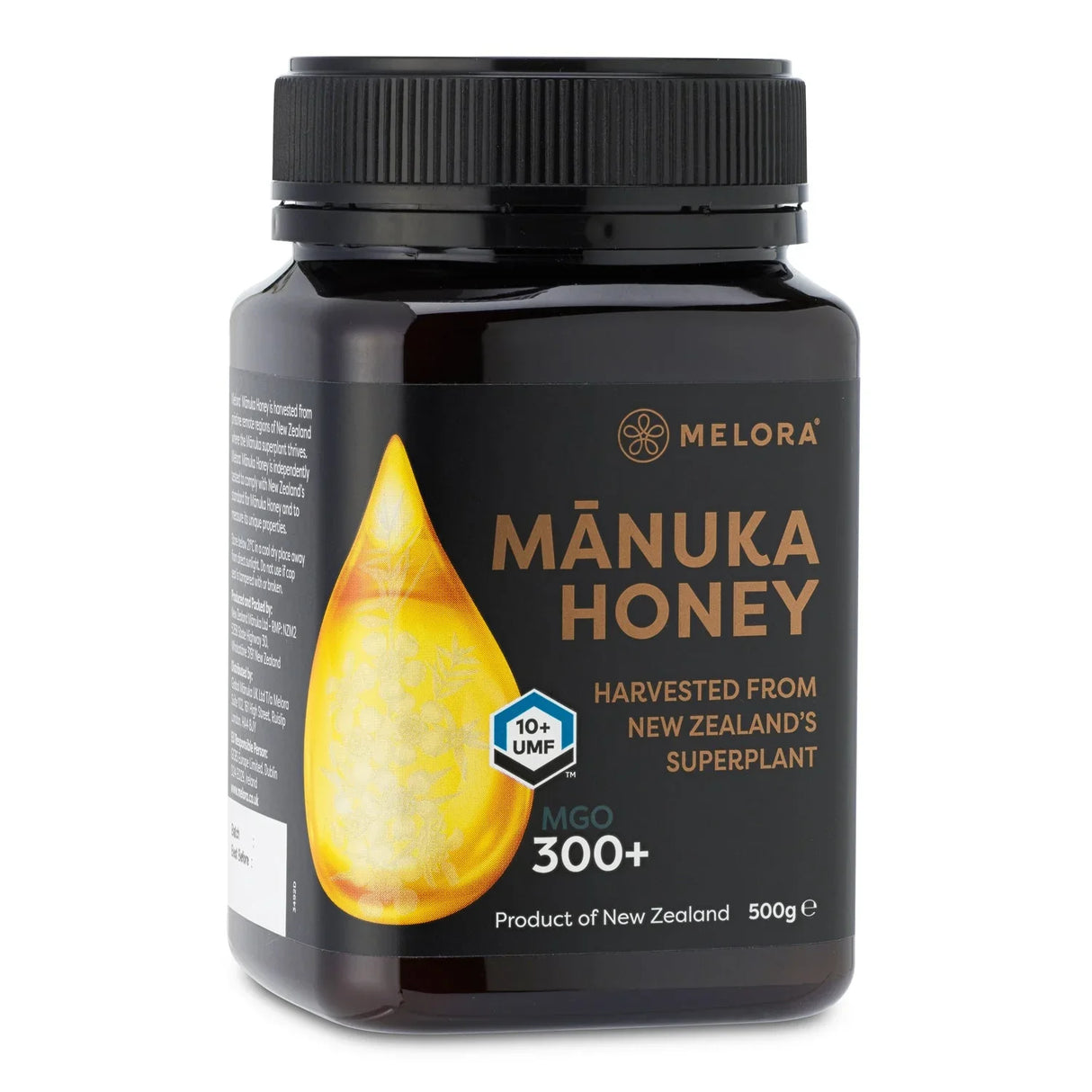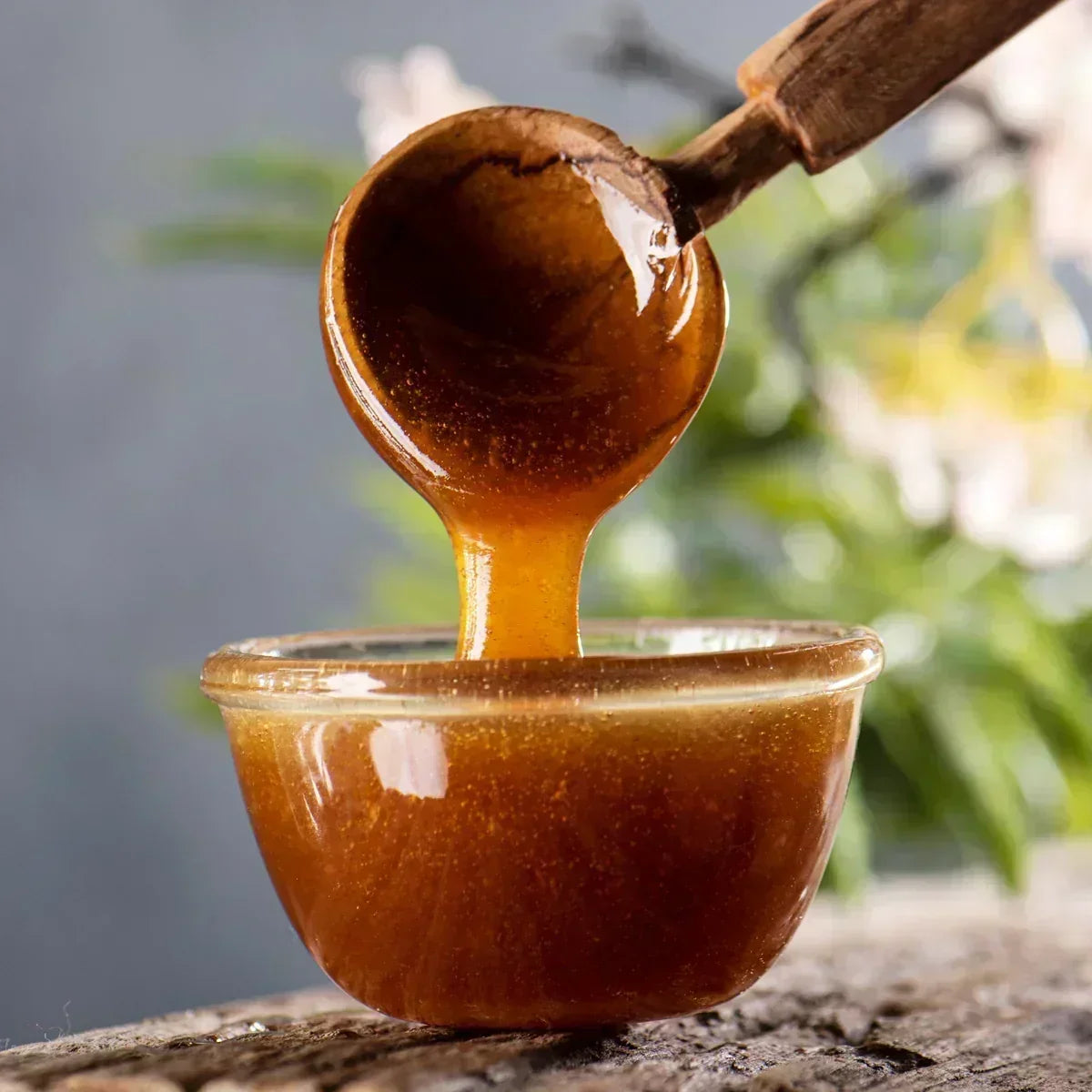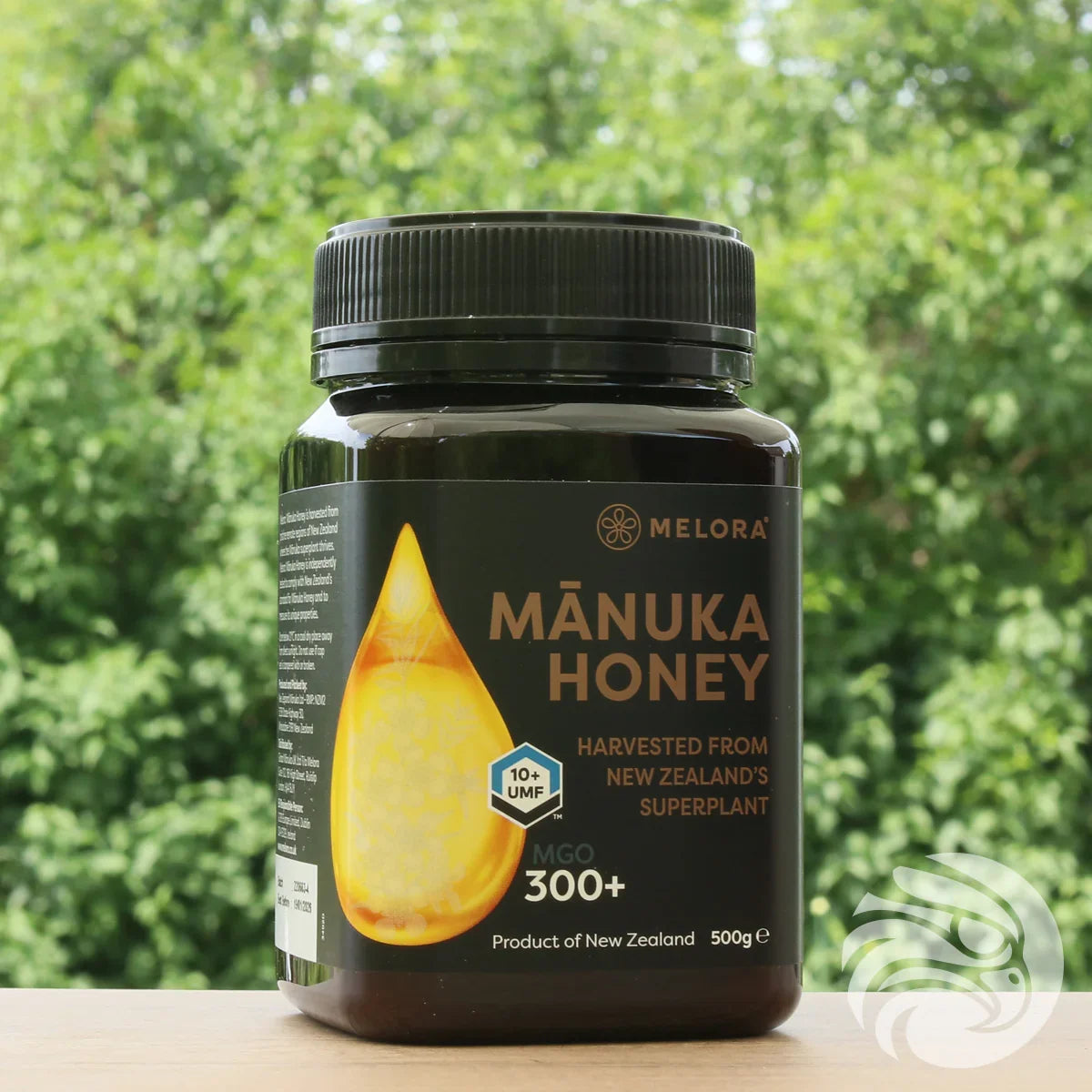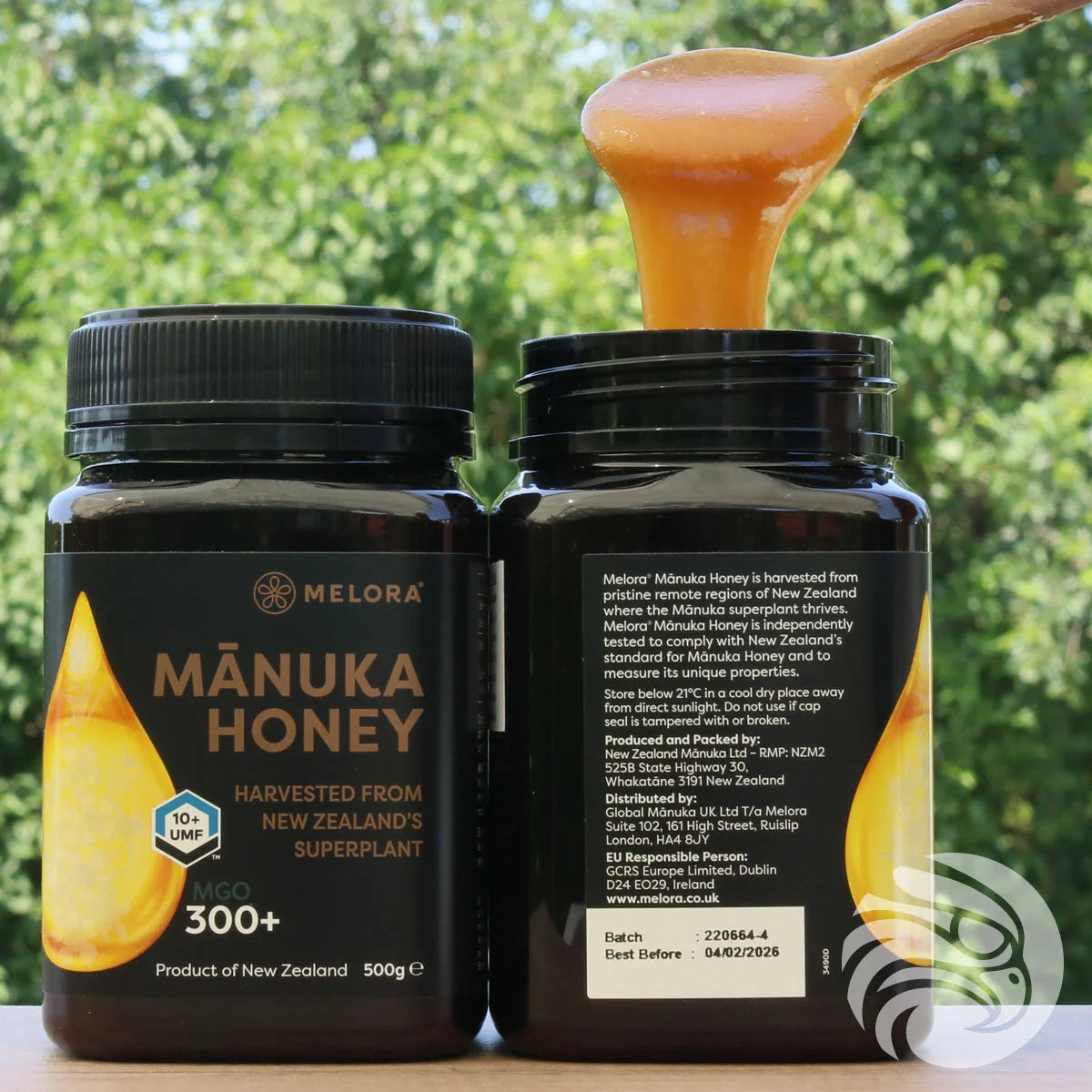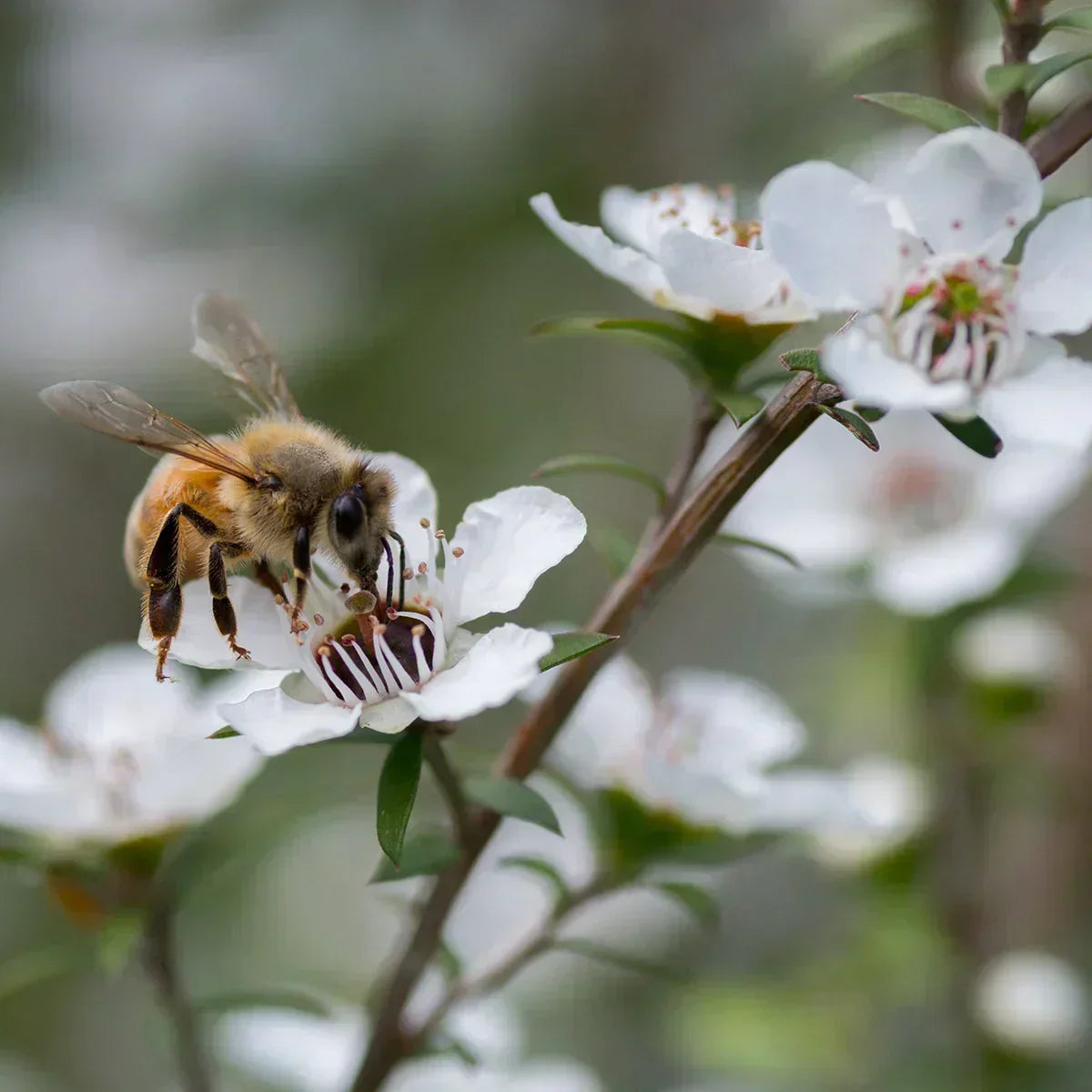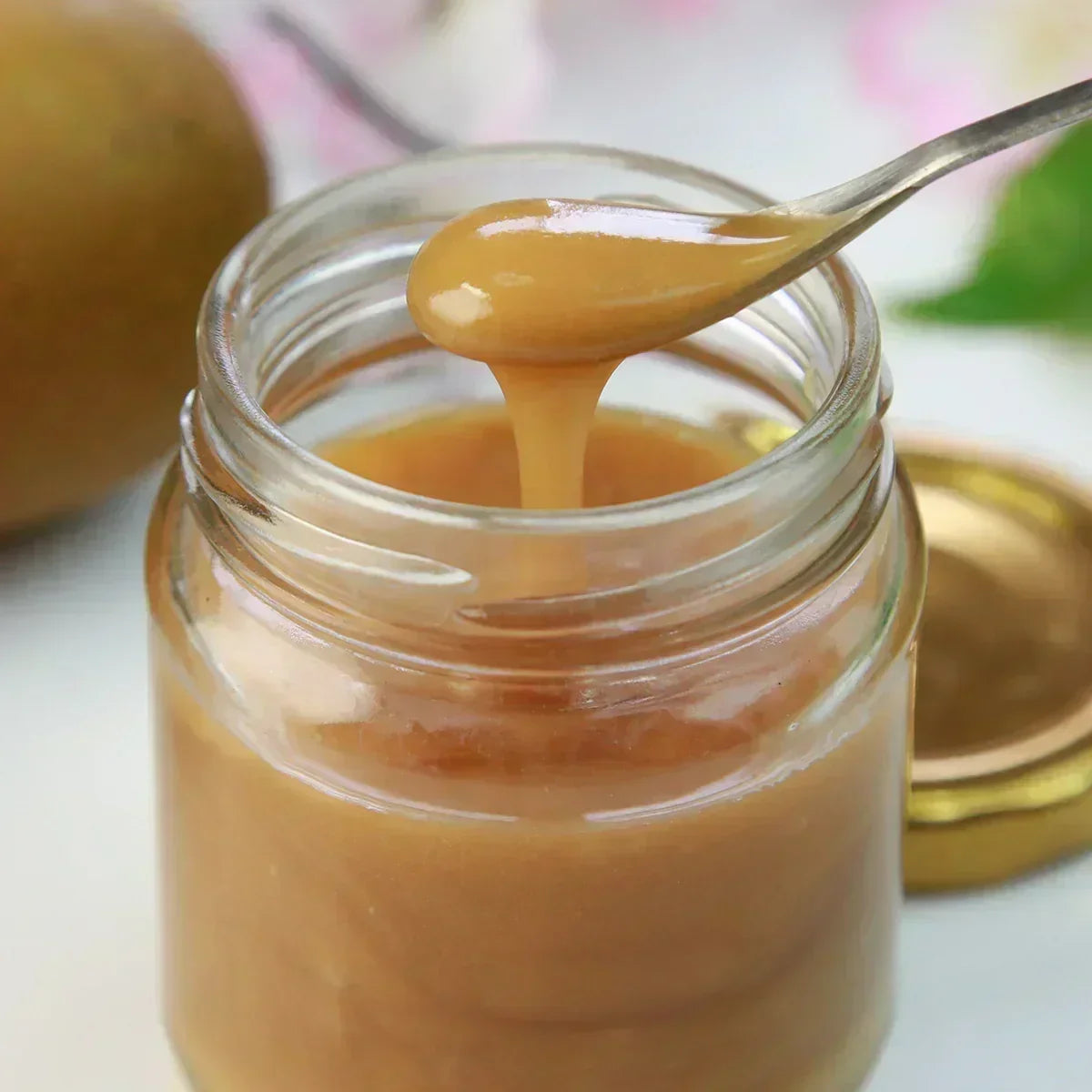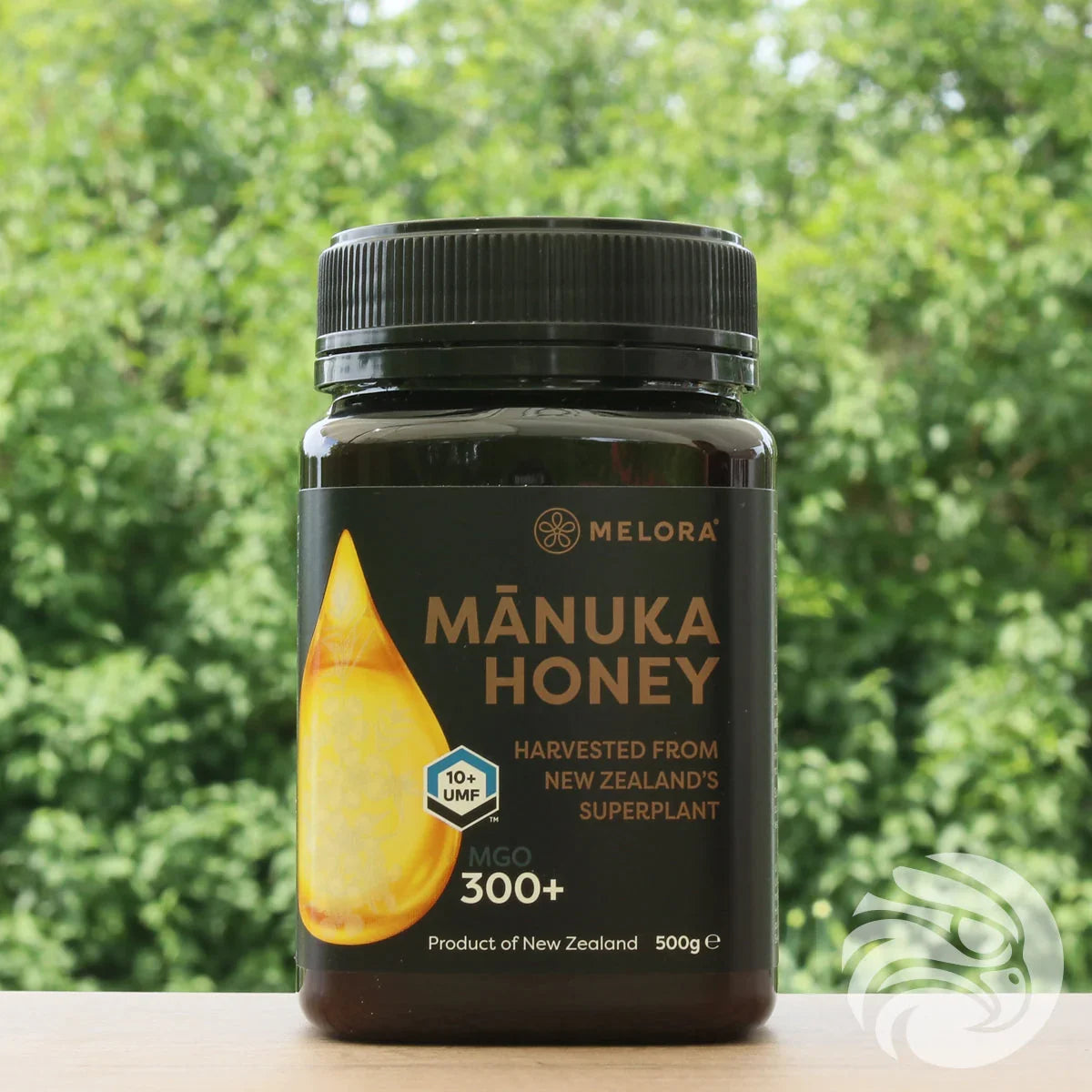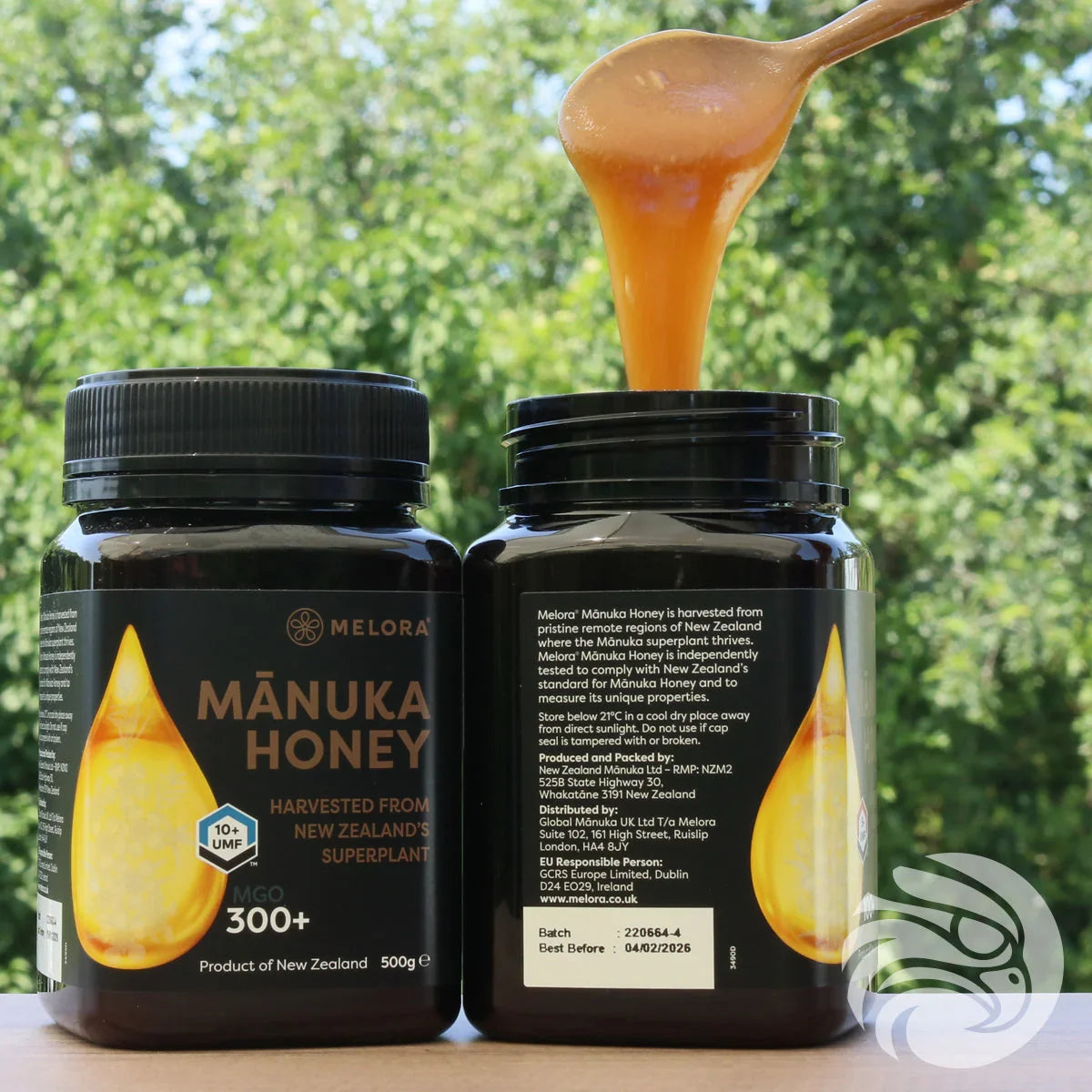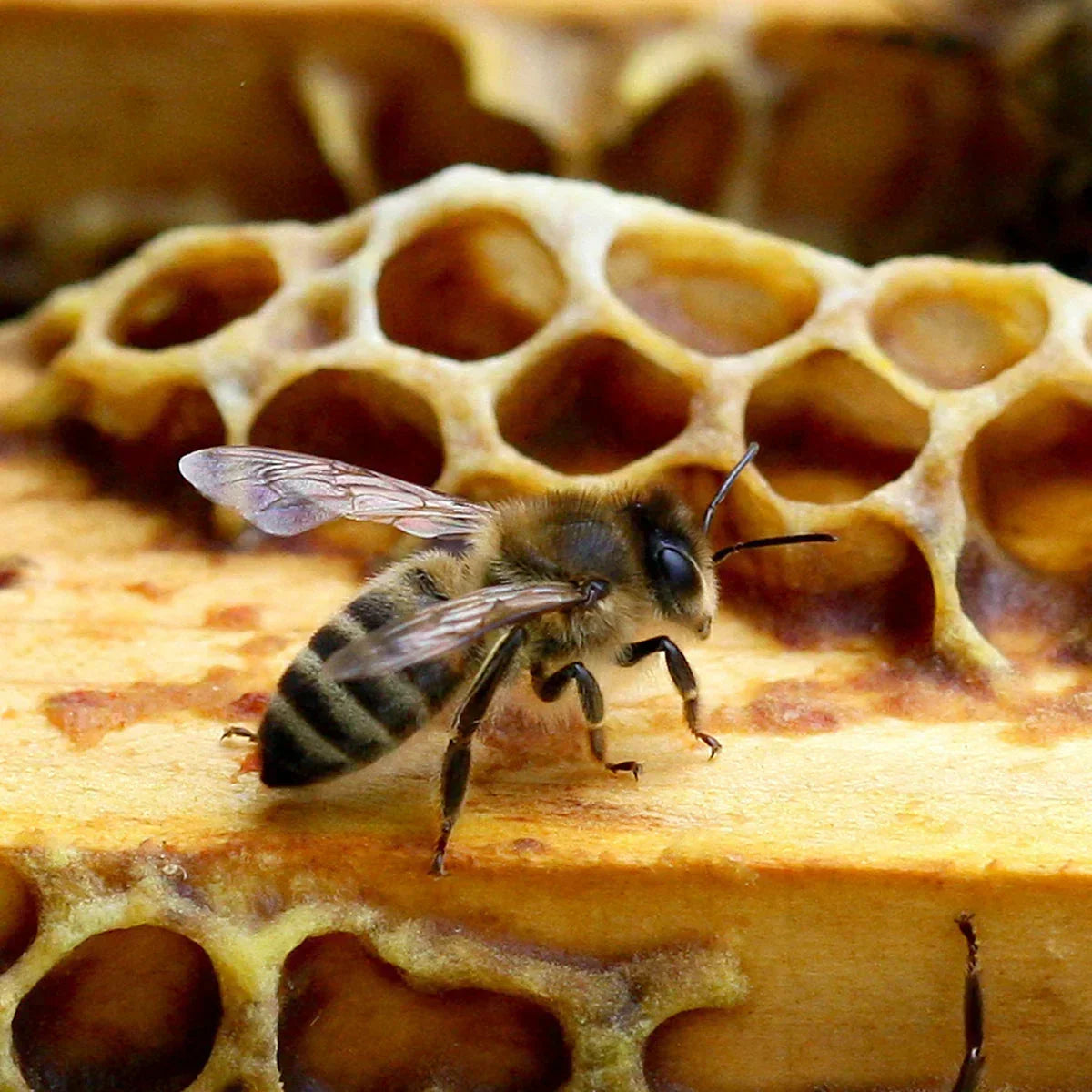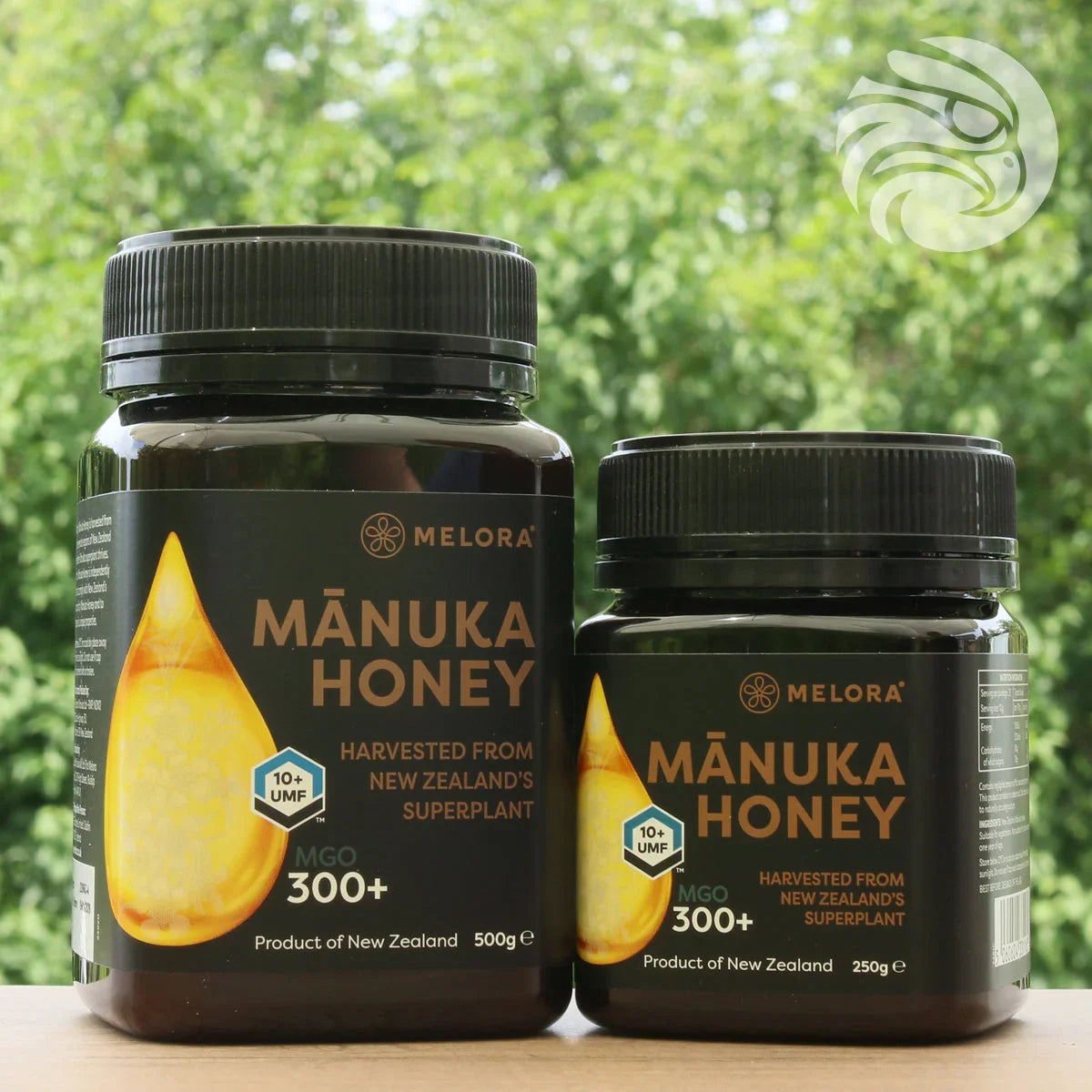Melora Manuka Honey 300+ MGO™ UMF 10 • 500 g
Fast Shipping
FREE shipping over 99€
FAST delivery from stock.
Guarantee
30 days Money Back Guarantee!
Payment options


Manuka honey comes from the nectar of the Mānuka bush (Leptospermum scoparium), which is native to New Zealand.
Melora Manuka honey is produced and packaged by local farmers and family communities in New Zealand in a sustainable way. The family-run company works closely with local beekeepers, who care for and protect the valuable Mānuka trees.
In addition to the well-known MGO certification, it also has UMF certification.
The MGO / UMF rating on Manuka honey labels indicates the honey's strength—the higher the number, the greater the concentration of active ingredients. [01.]
| Packaging: | 500 g |
| Strength: | MGO 300+ / UMF10 |
| Serving size: | 10 g - 25 g |
| Servings per product: | 10 - 25 |
☀ Recommended uses:
- Directly with a spoon, straight from the jar
- Added to lemon lemonade
- Mixed into yogurt or oatmeal
- As a sauce, paired with savory dishes
- Applied externally, directly to wounds
Manuka honey is an excellent natural sugar substitute for everyday use.
This product can be consumed continuously, without breaks.
Warning: Do not give any honey to children under 12 months of age.
Storage: Keep in a dry, light-protected place, at a temperature below 17-21°C.
About the texture and color of Manuka honey
Mānuka honey is a natural product, and its texture and color are influenced by seasonal and regional conditions. In some areas, bees produce lighter honey, while in others, it is darker. The taste of Mānuka honey can also vary, and its color tends to darken with the age of the Mānuka tree.
The effect of Manuka honey on bacteria
The active compounds in Manuka honey actually affect the genetic material of bacteria. This means that bacteria cannot develop resistance to Manuka honey, nor can they effectively defend themselves against it. [02.]
Active Manuka honey is the first honey to be officially recognized by medical science.
About storage
For long-term storage, it is ideal to keep Manuka honey below 21°C. Frequent temperature fluctuations can affect the honey’s texture and the level of active compounds.
Do not freeze and do not store at near-freezing temperatures.

About UMF certification
The UMF label on the product packaging stands for Unique Mauka Factor, which guarantees the quality of the honey.
Only Manuka honey producers who comply with the strict UMF Honey Association code of practice are allowed to use the UMF designation.
The association operates similarly to organic certification bodies, conducting regular inspections of producers. The Melora Group is a member of the UMF association, which is why it is authorized to use the UMF label on its products. License number: #2015.
Methylglyoxal
Methylglyoxal is naturally formed in the nectar of the Mānuka flower, which is collected by bees. It is important to note that methylglyoxal in Manuka honey is resistant to heat, light, bodily fluids, and enzymes.
This makes it extremely unique and capable of combating even superbugs such as Streptococcus (MRSA), H. Pylori, and E. coli. [03.]
New Zealand Manuka honey
New Zealand is a remote, untouched paradise island, home to a diverse range of exotic and native plant species. Melora carefully selects only the finest plant-growing regions for Manuka honey production.
The production of the strongest Mānuka honey requires unique climatic conditions. The soil, climate, and ecological environment together create the ideal conditions for cultivation.
A brief history of Manuka honey
The history of Manuka honey dates back to New Zealand’s first settlers, the indigenous Māori people. The Māori referred to this remarkable plant as "taonga", meaning "treasure".
The most extensive scientific research on Manuka honey was conducted by biochemist Peter Molan. During the 1980s and 1990s, he clearly confirmed its antibacterial effects.
Following these findings, the medical community took notice, and in some English-speaking countries, products made from stronger Manuka honey have even received pharmaceutical-grade certification.
6 conditions where we recommend using this MGO 300+ Manuka honey
| ✓ For adults' immune support |
| ✓ For treating acne and pimples |
| ✓ Throat inflammation |
| ✓ For minor wounds and cuts |
| ✓ Gut flora regeneration |
| ✓ Cold, flu |
The positive health effects of Manuka honey

The main active ingredient in Manuka honey, methylglyoxal, is a potent natural antibacterial compound that is only found in trace amounts in regular honey.
In Manuka honey, methylglyoxal (MGO) is present in high concentrations, making it essentially a natural antibiotic without side effects.
What makes Manuka honey special is that bacteria cannot develop resistance to it,
which means it can destroy even superbugs such as MRSA.
Supports digestive health
Manuka honey has an outstanding effect on digestive system support.
It functions as a natural prebiotic, meaning it feeds beneficial gut bacteria,
helping to maintain a healthy gut flora.
Additionally, its anti-inflammatory properties help alleviate symptoms of irritable bowel syndrome (IBS), reduce stomach pain and bloating, and inhibit the growth of Helicobacter pylori, the bacterium responsible for stomach ulcers. [04.]
Remarkable wound-healing and skin-regenerating properties
Due to its high viscosity, Manuka honey forms a protective barrier over wounds and burns, preventing infections and accelerating healing.
Methylglyoxal and the natural antioxidants in honey help reduce inflammation
while stimulating tissue regeneration. This is beneficial not only for external wounds and injuries but also for treating ulcers in the mouth and stomach.
Manuka honey is one of the best natural, side-effect-free remedies for stomach and intestinal ulcers.
A powerful immune system booster
The polyphenols in Manuka honey help neutralize free radicals, which are responsible for cell damage and aging processes. Regular consumption enhances white blood cell activity, improving the body's defense against viruses and bacteria.
This is particularly beneficial during cold and flu seasons. [05.]
Effective for acne, eczema, and other skin conditions
Manuka honey can be used to treat acne, eczema, and other skin problems.
It moisturizes the skin, reduces redness, and promotes natural skin regeneration.
Regular use contributes to healthy, youthful-looking skin.
Properties of Melora Manuka honey
| Raw honey | yes |
| Made with a gentle process | yes |
| Delicious, creamy taste | yes |
| Unprocessed & raw | yes |
| Free from Contaminants | yes |
| High active ingredient content | yes |
| Over 20 years | yes |
| Keto-friendly | no |
| Paleo-friendly | no |
| Low Carb diet | no |
| Fasting | no |
| Vegan / Vegetarian | no |
| High blood pressure | yes |
| Diabetes | no |
| Autoimmune Diseases | yes |
Why is Mānuka Honey So Expensive?

Mānuka honey is produced exclusively in New Zealand and certain parts of Australia, where the native Leptospermum scoparium (Mānuka) bush grows. Unlike standard honey, which can be produced worldwide, Mānuka honey is geographically restricted, making its supply limited.
The flowering period of the Mānuka bush is incredibly short - only 2 to 6 weeks per year. This means beekeepers have a very small window to collect nectar, and any adverse weather conditions can significantly reduce honey production for that season.
Complex + Labour-Intensive Harvesting process
Harvesting Mānuka honey is no simple task. Beekeepers must place hives in remote locations, often requiring off-road vehicles to transport beekeeping equipment due to the rough terrain. It is not uncommon for beehives to be placed in a specific area only by helicopter.
Unlike traditional honey farming, Mānuka honey requires meticulous extraction, filtering, and testing to ensure its purity and potency.
Beekeepers must also deal with natural challenges such as climate variations, hive diseases, and unpredictable nectar flow, all of which can further limit honey production. The honey is carefully extracted without overheating to preserve its beneficial properties. This level of precision and care further contributes to its higher price.
-
Health issues and physical conditions for which we recommend making it part of the therapy:
-
Digestive systemEsophagitis • Irritable bowel syndrome • Ulcerative colitis
-
Skin, Hair, NailsHerpes • Wounds, Cuts • Acne, Oily skin • Bedsores
-
Metabolism & EnergyWeakness • Fatigue
-
Lungs, BreathingThroat inflammation
-
Immunity, AllergyInfluenza virus • Sinusitis • Weakened immunity • Cold, Common cold
This product can be used during the following diets:
This product contains the following allergens:

